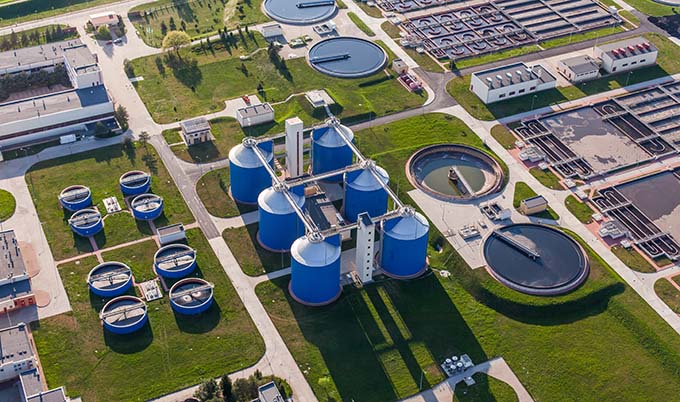wastewater Covid testing
Sewage research signals early warning of coronavirus outbreaks
Published on: 23 October 2020
A project involving experts at Newcastle University is successfully detecting traces of coronavirus in sewage, providing an early warning for local outbreaks across the country.
The government-led programme has now proven that fragments of genetic material from the virus can be detected in wastewater. This can then indicate where a local community or an institution is experiencing a spike in cases.
The results can provide local health professionals with a clearer picture of infection rates by identifying where there are high numbers, particularly for asymptomatic carriers who are displaying no symptoms. This will allow local authorities to take early action to slow the spread of the virus, especially via asymptomatic carriers.
The project has already worked successfully in an area in the South West of England, where sewage sampling data showed a spike in coronavirus material despite relatively low numbers of people seeking tests.
This data was passed on to NHS Test and Trace and the local council, who were able to alert local health professionals to the increased risk and contact people in the area to warn of the increase in cases.
Testing has now been rolled out across more than 90 wastewater treatment sites in the UK, covering approximately 22 per cent of the population in England, with plans to expand in the future.
SARS-CoV-2, the COVID-19 virus, does not readily spread through sewage. However, non-infectious genetic residues of the virus can remain in wastewater systems where infected people go to the toilet, even those with no symptoms. The World Health Organization is clear that the likelihood of coronavirus being transmitted via sewerage systems is extremely low or negligible.
The work at Newcastle University is being led by Professor David Graham, who is also a member of the Transmission in Wider Environment Group (TWEG) providing guidance to UK Scientific Advisory Group for Emergencies (SAGE) in relation to the current COVID-19 pandemic.
His team, led by Dr Marcos Quintela-Baluja in close association with colleagues at Northumbrian Water, has been testing wastewater samples from across North East England since March. This work is part of the National Wastewater Epidemiology Surveillance Programme, funded by the Natural Environment Research Council, part of UKRI, and led by the Centre for Ecology & Hydrology.
Professor Graham said: "Although we needed to invest a lot of energy in developing new methods for quantifying SARS-CoV-2 in wastewater, early results have been incredibly promising. Wastewater virus levels are clearly higher in places with higher COVID-19 cases, and we are now working with colleagues across the UK to support predictive tools for public health protection."

UK-wide monitoring
Defra, the Environment Agency and Joint Biosecurity Centre (JBC) are collaborating on the English programme and chairing a UK-wide group to ensure coordination between Scottish Government, Welsh Government and academic projects. The testing is being led by the Environment Agency’s Starcross laboratory in Exeter.
The JBC is also conducting pilots to test how this approach can generate targeted scientific intelligence to help health authorities make future decisions, including assessing how precisely wastewater can be used to identify coronavirus sources.
Environment Secretary George Eustice said: “This is a significant step forward in giving us a clearer idea of infection rates both nationally and locally, particularly in areas where there may be large numbers of people who aren’t showing any symptoms and therefore aren’t seeking tests.
“NHS Test and Trace is able to use the science to ensure local health leads are alerted and can take action.
“We are continuing to look at how this programme can be refined as one of the many measures we’re using to slow the spread of the virus and protect local communities.”
Health and Social Care Secretary Matt Hancock said: “This initiative is just one example of how we are working across government and with local partners to find innovative, new ways to track the outbreak, slow the spread of the virus and save lives.
“Monitoring and sampling wastewater offers another tool to help us identify outbreaks early on – helping NHS Test and Trace and local authorities target hotspots quickly and effectively.
“As we see an increase in cases across the country, it remains vitally important that everyone continues to follow Hands, Face and Space, gets a test and self-isolates if they display any COVID-19 symptoms and follows the advice of NHS Test and Trace.”
Dr Davey Jones, Professor of Soil & Environmental Science at Bangor University, said: “We have been monitoring viruses like Norovirus and Hepatitis in human sewage for the last decade, as part of a programme to evaluate levels of these viruses in the community. We added COVID-19 to the surveillance list in March this year.
“We showed that viral levels in wastewater mapped really well onto the success of lockdown measures in the first COVID-19 wave and to the emergence of the second wave. We are now using it to track the emergence and control of COVID-19 cases and working on new pilots to map the virus at both the local and the regional scale.”
Press release adapted with thanks to Defra



